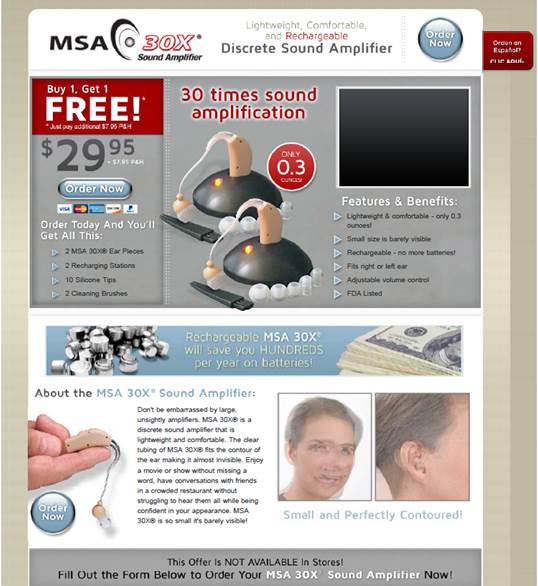Why are you mumbling?
The TV is not too loud!
What did you say? This restaurant is like Grand Central Station.
For millions of Americans, an unwelcome “I’m turning into my parents” milestone is noticing that conversations aren’t as clear as they used to be. Hearing aids can be pricey though and aren’t covered by traditional Medicare or most insurance. Three related Florida businesses stepped into the marketplace with MSA 30X, a device advertised on TV and elsewhere with the promise that it was “independently tested to help you hear up to 30 times better.” But according to the FTC, the defendants amped up their claims well beyond what they could prove.
 Advertised in English and Spanish and selling for about $30, MSA 30X is a small, rechargeable, wearable sound amplifier. The defendants’ ads showed older consumers expressing frustration with having to jack up the volume on the TV or not hearing clearly in crowded rooms. According to the company’s website, “Enjoy a movie or show without missing a word, have conversations with friends in a crowded restaurant without struggling to hear them all while being confident in your appearance.”
Advertised in English and Spanish and selling for about $30, MSA 30X is a small, rechargeable, wearable sound amplifier. The defendants’ ads showed older consumers expressing frustration with having to jack up the volume on the TV or not hearing clearly in crowded rooms. According to the company’s website, “Enjoy a movie or show without missing a word, have conversations with friends in a crowded restaurant without struggling to hear them all while being confident in your appearance.”
But according to the FTC, the company didn’t have appropriate proof to support their claims that with the MSA 30X, people who have trouble hearing will hear clearly when watching TV at a moderate volume and won’t miss a word at the movies or in places like restaurants. What about the company’s representation that the product was “independently tested to help you hear up to 30 times better”? Flat-out false, says the FTC.
To settle the case, the defendants have agreed to an order that will require them to have human clinical testing to support future representations similar to the claims challenged in the complaint. Other statements about the efficacy of any device will require competent and reliable scientific evidence. Due to the defendants’ financial condition, the judgment of $47 million will be suspended upon the payment of $500,000. (If the defendants have misrepresented their financial status in any material way, the FTC can ask the Court to reinstate the entire judgment.)
Looking for compliance tips? Lend us your ears.
Support your claims with sound science. The defendants said MSA 30X had been “independently tested to help you hear up to 30 times better.” It’s FTC Law 101 that advertisers must have “at least the advertised level of substantiation.” But even if companies don’t make what the FTC calls establishment claims – statements about the kind of scientific support you have to back up your representations – they still need methodologically sound proof to support the kind of claims the defendants made in this case.
Avoid the visual equivalent of whispered “disclaimers.” Some of the defendants’ ads contained small print that said, “The MSA 30X Sound Amplifier is not a substitute for a hearing aid or intended for use by hearing impaired people. The FDA advises anyone who suspects hearing loss to seek evaluation by a health care professional.” And yet the ads featured grey-haired models “frustrated with [their] hearing” who complained about devices with batteries that were “always such a pain to change and so costly.” The FTC looks to the net impression that members of the target audience take from an ad. Companies can’t expect a brief visual or small print to undo the claims they hammer home in the rest of the ad.
Boomer has it. If you’ve noticed that the FTC is bringing more cases addressing cognition, joint pain, and other maladies affecting Consumers of a Certain Age, it’s because we go where the marketplace is going. Some companies track the trendy teens, but let’s face it: Baby boomers have the bucks and are looking for answers to chronic health considerations. Advertisers eager to appeal to that demographic need to remember that established truth-in-advertising principles apply.

In reply to How do we get a refund? by mstech2k